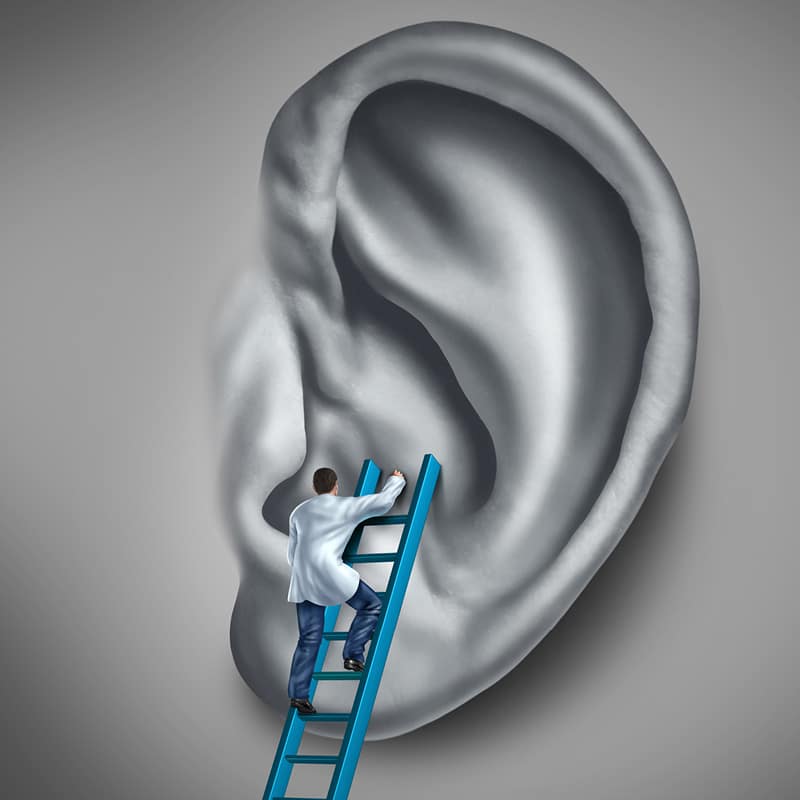Dizziness & Vertigo
Whether running in circles as a child or riding the tilt-a-whirl at an amusement park, most people have felt dizzy at some point in their lives. But the sensation of feeling lightheaded or unsteady can be very scary when it hits you for no obvious reason. The inner ear is one of the organs in our body responsible for our sense of balance, and disorders related to the inner ear often cause dizziness.
Distinguishing the source of the balance problem or dizziness can be difficult and often requires the expertise of a physician with particular training in that area. The otolaryngologist and audiologists at CornerStone Ear, Nose & Throat can help determine if dizziness is the result of an inner ear disorder or another cause.

Categories Of Dizziness
Vertigo
Vertigo is a specific form of dizziness that can sometimes be directly related to an issue with the inner ear. People with this condition feel that they are moving or that the environment around them is moving when neither is actually happening. Vertigo lasting more than a few minutes is usually accompanied by nausea and vomiting as the brain struggles to make sense of the conflicting information it receives. It is important to understand that the term vertigo is not a diagnosis or a disease. It is a symptom and might be the result of numerous conditions.
Imbalance
Imbalance or disequilibrium refers to the inability to maintain balance especially when standing or walking.
Lightheadedness
Lightheadedness is most similar to a feeling of nearly passing out or a head rush that can sometimes be experienced when rising too quickly from a sitting or lying position to a standing position.
The ENT Connection
The inner ear provides both a hearing and a balance function, and our doctors evaluate many patients who complain of dizziness. The balance portion of the inner ear, called the vestibule or labyrinth, communicates with the eyes and brain, as well as the muscles of your body, to help maintain balance. There are a variety of inner ear conditions that can cause dizziness, but not all dizziness is inner ear-related.
Diagnosing Dizziness
From an otolaryngology standpoint, the most common test used to diagnose dizziness is called a Videonystagmography (VNG). This test is performed in the office by doctors of audiology at CornerStone Ear, Nose & Throat. VNG measures the strength and function of each inner ear balance system as well as tests the coordination of eye movements. During certain portions of this testing, it is normal to experience dizziness.
Our diagnostic evaluation will also include a physical examination of your ears, nose, and throat, as well as a check of your blood pressure, nerve and balance function, and hearing. Additional tests to determine the source of your dizziness may include a CT or MRI scan of your head.
Based on the results of the examination and testing, recommended care may include medications, therapeutic maneuvers, balance exercises, or vestibular rehabilitation if permanent damage has been done.

Inner Ear Conditions That Can Cause Dizziness
Benign Paroxysmal Positional Vertigo (BPPV) – This is a fancy term that basically describes a sensation of spinning vertigo that is triggered by certain head positions such as rolling over in bed or tilting the head backward or forwards. It is thought to be caused by small crystals in the inner ear fluid that becomes lodged in a certain part of the balance system. This causes the sensation of spinning when the crystals shift position in the inner ear as the head is moved. This type of vertigo can occur without any precipitating event, but can also occur after head trauma. BPVV can usually be diagnosed in the office or when VNG testing performed, and can usually be treated with a re-positioning maneuver performed in our office.
Meniere’s Disease – This inner-ear disorder is caused by too much inner-ear fluid, which can lead to a sudden rupturing of the inner-ear membranes. The result is sudden, severe vertigo that can last for hours. The initial attacks are often the worst. Classic symptoms include:
- Vertigo with nausea or vomiting
- Tinnitus (loud ringing in the ear)
- Sensation of fullness or pressure in the affected ear often preceding the attack
- Fluctuating nerve damage hearing loss, which is often worse after the attack but which may improve with healing.
Once diagnosed, medical and surgical treatments are available for Meniere’s Disease.
Viral Infections – Usually, these conditions are self-limited, meaning they will resolve on their own, but certain medications can help improve the symptoms and at times balance exercises can speed the recovery. If hearing loss, facial paralysis, or facial paralysis accompanied by blisters of the external ear is associated with vertigo, immediate medical attention by an Ear, Nose & Throat doctor is strongly recommended.
Vestibular schwannoma or acoustic neuroma – A rare benign tumor of the balance nerve can affect the balance system as well as cause hearing loss, facial weakness, and ringing in the ears (tinnitus).





